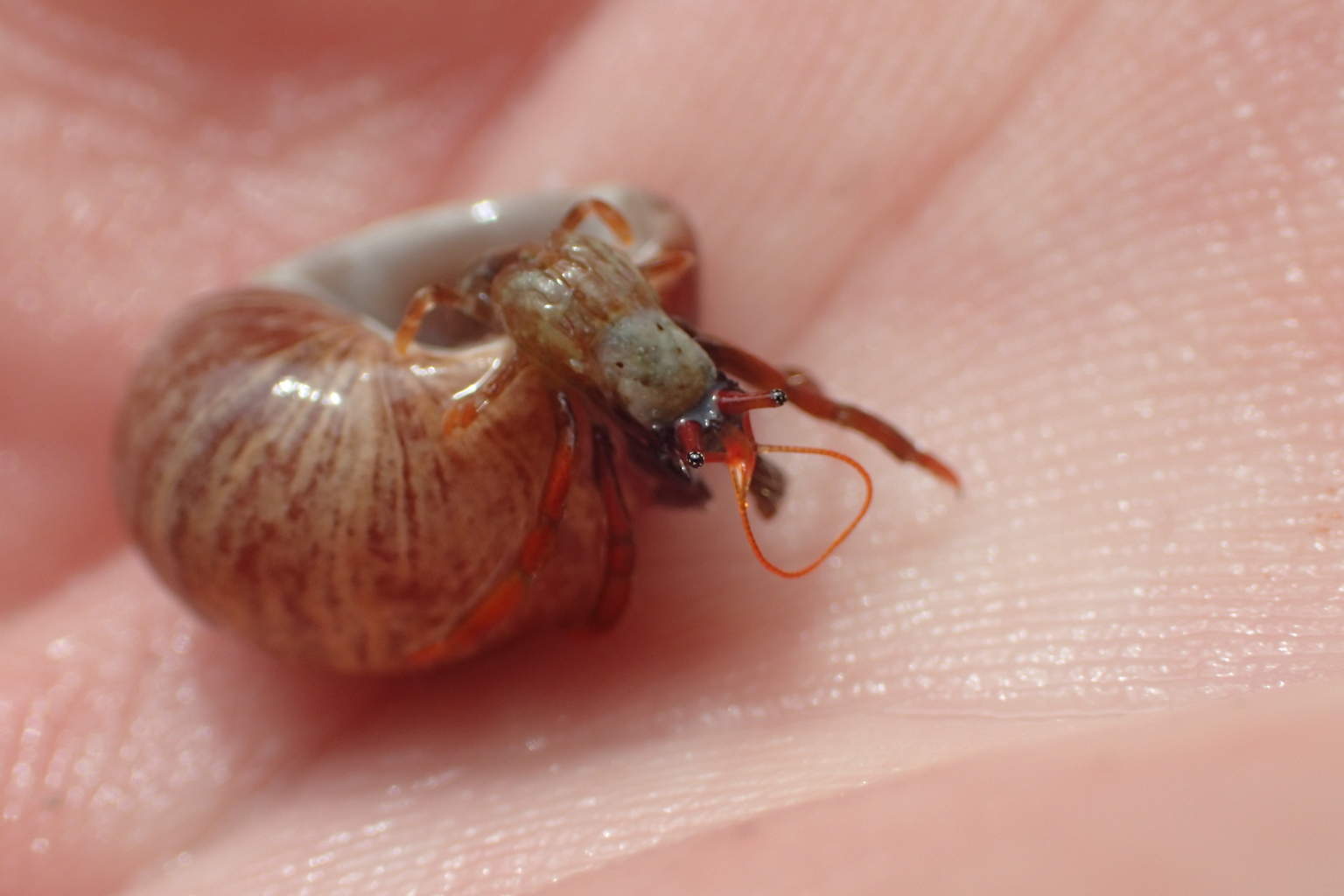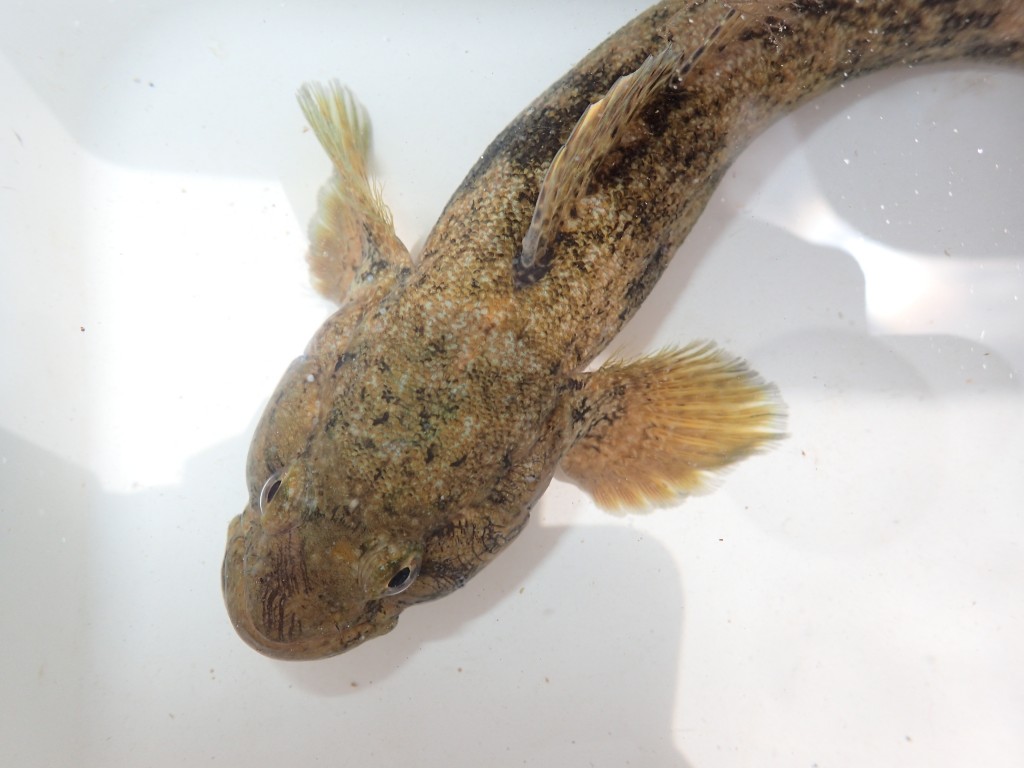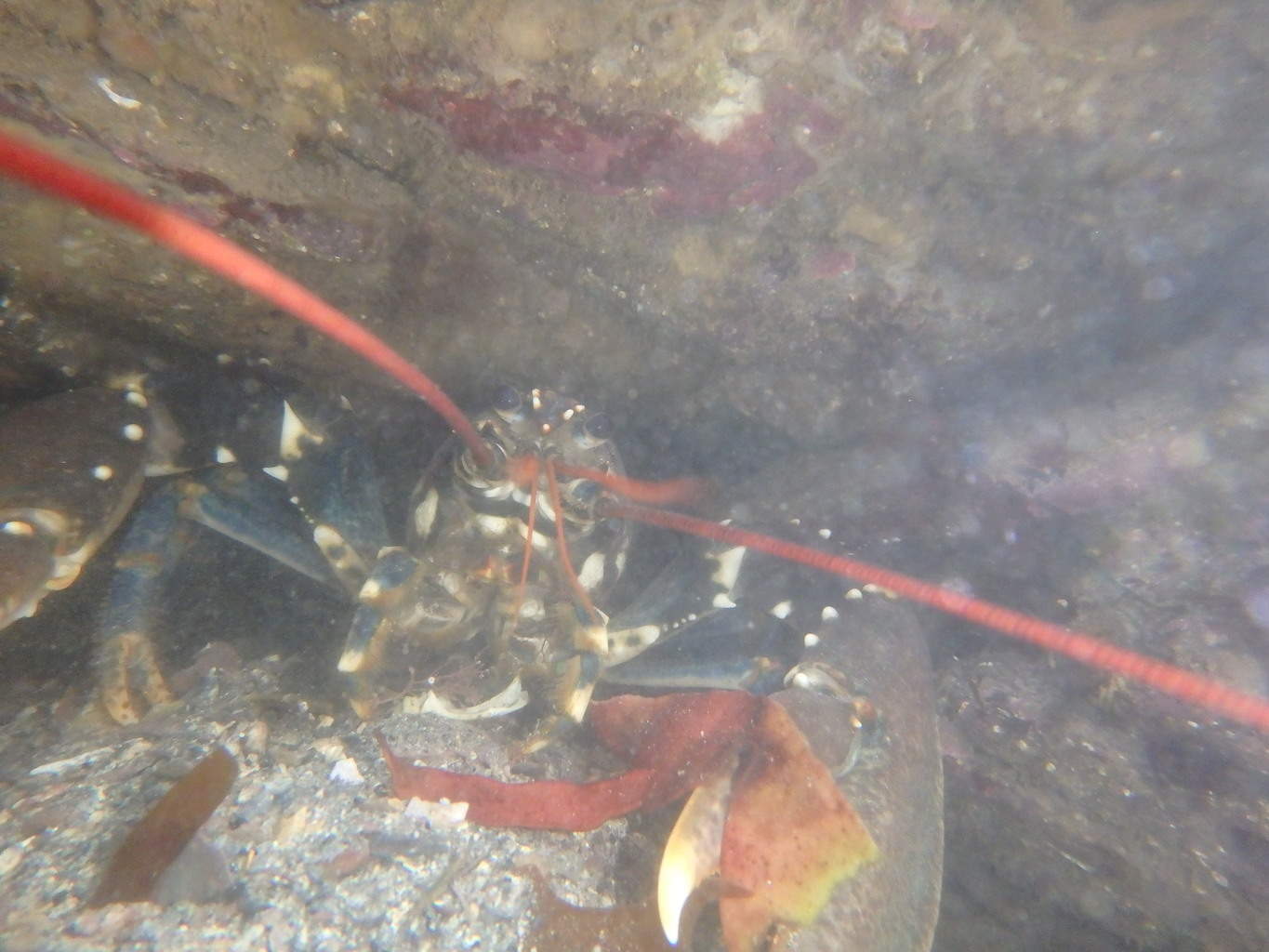Marine Life & Conservation
Summer of Surprises!

The summer season is now coming to an end here at Wembury Marine Centre, but what a year it’s been! This season we have opened our doors to almost 25,000 visitors, worked with 2500 school and college students and engaged with 2000 members of the public through our marine outreach programme.
Our regular Rockpool Safaris are a firm favourite for families and this season we have found some amazingly weird and wonderful species. Here is my top five for 2016:
St Piran’s hermit crab, Clibanarius erythropus
Back in August, one of our long term volunteers John Hepburn found what he thought to be a ‘normal’ Common hermit crab on one of our public rockpool safaris. Upon closer inspection he realised it looked a bit different, but being colour blind he couldn’t really tell. He took a few close up pictures and when we had a look on the computer back in the Centre, we realised this was no normal hermit crab! It turned out to be the St Piran’s Hermit Crab, Clibanarius erythropus, which hadn’t been recorded in Devon for more than 30 years! St Piran’s hermit crabs are different to the Common hermit crab, Pagurus bernhardus, in that they have distinctly red legs and claws and red eye stalks with black and white eyes. It is thought that the hermit crabs (along with the dog whelk shells they often live in) were heavily affected by the Torrey Canyon oil spill back in the late 60s, which wiped out much of their population. Our find made the national news and we have since found quite a few more individuals. Let’s hope they have made a comeback and are here to stay!
Giant goby, Gobius cobitis
In the UK, the giant goby is usually only found along the coast of south-west England between Wembury and the Isles of Scilly, and in the Channel Islands. This large goby, reaching a maximum length of 27cm, is quite a rare find in Britain because here they are on the northern edge of their natural range, although climate change may see them move further north in the future. These large intertidal fish are usually found in sheltered rockpools higher up on the shore. Given their rarity and the fact that they are vulnerable to human disturbance and trampling, giant gobies are now a protected species and you must have a licence to handle them! They can be easily confused with other goby species, so as soon as we’d taken a picture of this one in our tub and realised it might be a Giant goby, we put it straight back where we found it, as we do with all our creatures on our rockpool safaris!
Common lobster, Homarus gammarus
Again it was volunteer John who found the first Common lobster ever to be spotted on a Wembury rockpool safari! Trying out his new weighted camera, he left it in our favourite large rockpool for the duration of our safari and when he got home and looked over the footage, he found the young lobster excavating a burrow! Common lobsters are very rare to find in rockpools, usually preferring the relative safety of deeper waters. They can grow to a maximum size of 75cm but the one we found was probably about 25cm max. Common lobsters have been over exploited commercially in British waters and their numbers greatly reduced. Our Mr lobster (we don’t actually know if he’s male or female!) has been seen poking his claws out numerous times throughout the season and was still there today on our penultimate rockpool safari of the year, so let’s hope he’s found himself a safe haven! PS: interesting fact about lobsters – they don’t ever slow down, weaken or lose fertility with age as they have a special enzyme which repairs DNA sequences. So theoretically, they could live forever if it wasn’t for fishing, disease or being preyed upon!
Stalked jellyfish, Lucernariopsis campanulata
These tiny upside-down jellyfish are extremely hard to spot and so often completely missed when rockpooling. Stalked jellyfish usually attach themselves to the ends of fronds of seaweed or seagrass and float around in the water catching bits of plankton. The one we found had attached itself to a beautiful piece of sea lettuce. This species in particular can grow up to 5cm tall but is usually found much smaller and its colour varies from a uniform red to green to brown. It has eight arms with about 45 tentacles on each arm and is an absolute delight to find when you’re least expecting it!
Bloody henry starfish, Henricia oculata
It wouldn’t be right to talk about rockpooling at Wembury without including at least one species of starfish! The small Cushion stars are very common here; almost every rock you turn over on the mid shore will have one stuck to its underneath, but they never fail to evoke the wow factor, from little ones right up to grandparents. The much larger Spiny starfish are fairly common here too and one of my absolute favourite finds on a rockpool safari. But one species we weren’t expecting to find was the Bloody henry starfish! Arguably one of the most striking and beautiful of all of the UK’s starfish, it gets its name from its deep red, pink or purple colouring. Usually preferring deeper water, this species would be much more likely to be spotted by a diver rather than a young rock pooler, but our ‘extreme rockpool safari’ on a brilliant low spring tide back in April saw us rambling further out on to the rocky reef than we’d usually go, and our efforts were repaid with a young girl and her family discovering this treasure!
All in all it was a wonderful summer of surprises for us here at Wembury Marine Centre. If you’d like to see more of the weird and wonderful marine life we’ve found this year then head to our Facebook page: www.faceboom.com/wemburymarine.
Marine Life & Conservation
Double Bubble for Basking Sharks

 The Shark Trust is excited to announce that, for two more days only, all donations, large or small, will be doubled in the Big Give Green Match Fund!
The Shark Trust is excited to announce that, for two more days only, all donations, large or small, will be doubled in the Big Give Green Match Fund!
Donate to Basking in Nature: Sighting Giants
The Shark Trust is hoping to raise £10k which will be doubled to £20k. This will go towards Basking in Nature: Sighting Giants. And they need YOUR help to reach they’re goal.
The Shark Trust’s citizen science project is to monitor and assess basking sharks through sightings; encouraging data collection, community engagement, and promoting nature accessibility. This initiative aims to enhance health and wellbeing by fostering a deeper connection with British Sharks.
Campaign Aims
- Increase citizen science reporting of Basking Sharks and other shark sightings to help inform shark and ray conservation.
- Provide educational talks about the diverse range of sharks and rays in British waters and accessible identification guides!
- Create engaging and fun information panels on how to ID the amazing sharks and rays we have on our doorstep! These can be used on coastal paths around the Southwest. With activities and information on how you can make a difference for sharks and rays!
- Promote mental wellbeing through increasing time in nature and discovering the wonders beneath the waves!
Donate, and double your impact. Click Here
Marine Life & Conservation
Leading UK-based shark conservation charity, the Shark Trust, is delighted to announce tour operator Diverse Travel as a Corporate Patron

 Corporate Patrons provide a valuable boost to the work of The Shark Trust. The Trust team works globally to safeguard the future of sharks, and their close cousins, the skates and rays, engaging with a global network of scientists, policymakers, conservation professionals, businesses and supporters to further shark conservation.
Corporate Patrons provide a valuable boost to the work of The Shark Trust. The Trust team works globally to safeguard the future of sharks, and their close cousins, the skates and rays, engaging with a global network of scientists, policymakers, conservation professionals, businesses and supporters to further shark conservation.
Specialist tour operator Diverse Travel has operated since 2014 and is committed to offering its guests high quality, sustainable scuba diving holidays worldwide. Working together with the Shark Trust will enable both organisations to widen engagement and encourage divers and snorkellers to actively get involved in shark conservation.
“Sharks are truly at the heart of every diver and at Diverse Travel, we absolutely share that passion. There is nothing like seeing a shark in the wild – it’s a moment that stays with you forever!” says Holly Bredin, Sales & Marketing Manager, Diverse Travel.
“We’re delighted to celebrate our 10th year of business by becoming a Corporate Patron of the Shark Trust. This is an exciting partnership for Diverse and our guests. We will be donating on behalf of every person who books a holiday with us to contribute towards their vital shark conservation initiatives around the world. We will also be working together with the Trust to inspire divers, snorkellers and other travellers to take an active role – at home and abroad – in citizen science projects and other activities.”
Paul Cox, CEO of The Shark Trust, said:
“It’s an exciting partnership and we’re thrilled to be working with Diverse Travel to enable more divers and travellers to get involved with sharks and shark conservation. Sharks face considerable conservation challenges but, through collaboration and collective action, we can secure a brighter future for sharks and their ocean home. This new partnership takes us one more valuable step towards that goal.”
For more information about the Shark Trust visit their website here.
For more about Diverse Travel click here.
-

 News3 months ago
News3 months agoHone your underwater photography skills with Alphamarine Photography at Red Sea Diving Safari in March
-

 News3 months ago
News3 months agoCapturing Critters in Lembeh Underwater Photography Workshop 2024: Event Roundup
-

 Marine Life & Conservation Blogs2 months ago
Marine Life & Conservation Blogs2 months agoCreature Feature: Swell Sharks
-

 Blogs2 months ago
Blogs2 months agoMurex Resorts: Passport to Paradise!
-

 Blogs2 months ago
Blogs2 months agoDiver Discovering Whale Skeletons Beneath Ice Judged World’s Best Underwater Photograph
-

 Gear Reviews3 months ago
Gear Reviews3 months agoGear Review: Oceanic+ Dive Housing for iPhone
-

 Marine Life & Conservation2 months ago
Marine Life & Conservation2 months agoSave the Manatee Club launches brand new webcams at Silver Springs State Park, Florida
-

 News3 months ago
News3 months agoWorld’s Best Underwater Photographers Unveil Breathtaking Images at World Shootout 2023




















